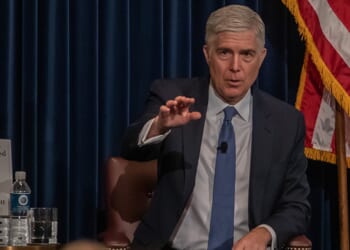South Korea needs to leverage its global economic strength to support U.S. priorities, bolster its importance in NATO, and enhance deterrence, especially amid shifting American focus and global uncertainties.
The Cold War historian John Lewis Gaddis defined grand strategy as “the alignment of potentially unlimited aspirations with necessarily limited capabilities.” This alignment could unfold through integrating domestic and foreign policies and coordinating regional strategies.
The United States, for example, strives to unify its strategies across Europe, Asia, and Africa while treating domestic vulnerabilities, such as Chinese influence operations on U.S. soil, as part of its broader China policy.
South Korea, the world’s twelfth-largest economy, has yet to construct a fully integrated grand strategy that matches its stature. Despite its global economic reach, Seoul often treats international affairs beyond the peninsula as peripheral concerns. With the fluctuating global order and shifting U.S. strategic priorities, South Korea needs a framework to navigate threats and seize opportunities.
South Korea’s Relationship with the United States
Recognizing the limits of American capacity is essential, not just to prepare for new risks but to leverage new possibilities. The current phase of the so-called U.S. retrenchment is not about abandonment, but rebalancing and delegation.
In recent years, Washington has pressed for German rearmament, lifted South Korea’s missile restrictions, transferred nuclear submarine technology to Australia, and pursued a reconciliation between Israel and Saudi Arabia to anchor Middle East security. This broader strategy empowers capable allies to share the burden of global stability while complementing U.S. strategic priorities.
Yet South Korea’s discourse regarding the second Trump administration remains narrow, centered on defense cost-sharing and, later, shipbuilding as disparate topics. These issues are essential but rarely discussed within a larger strategic vision: How could Korea leverage its capabilities to shape regional dynamics? What should it demand from Washington in return?
More critically, strategic silence has prevailed. Concerns about the “strategic flexibility” of U.S. Forces Korea (USFK)—the possibility of redeployment in contingencies like Taiwan—are often evaded and not addressed.
Public and private discussions are stifled by fear of political backlash and the impact of a potential change in government. While strategic ambiguity may have served short-term stability, the evolving Indo-Pacific landscape increasingly calls for open and forward-looking deliberations, however politically delicate they may be.
A historic window of opportunity is opening, along with the apparent risks. As the U.S. focus shifts to Asia under its “Asia-First” strategy, South Korea is well-positioned to emerge as a central American partner, not merely in symbolism, but in strategic substance.
Historically, hegemons and great powers enjoyed close partnerships with key allies. Portugal granted Britain vital access to global theaters during the British Empire’s heyday, the UK anchored Cold War Europe, and South Korea can serve as the linchpin of American strategy in the Indo-Pacific.
Korea’s role could include securing maritime trade routes, preventing territorial revisionism, and expanding its defense autonomy.
South Korea’s Increasing Importance in Europe
To realize this potential, South Korea must act as a proactive stabilizer and remain engaged in global security beyond the Korean Peninsula. This begins with Europe and the Indo-Pacific, arguably the most consequential arenas in contemporary geopolitics.
To be sure, being proactive does not require overextension. South Korean forces need not deploy globally. Instead, Korea should adopt a pragmatic, regionally tailored approach. Despite their symbolism, NATO’s naval forays into the Indo-Pacific added little to deterrence.
Similarly, a prominent Korean presence in Europe would be unrealistic and unproductive. A more efficient global division of labor would see allies take the lead in their regions, thus freeing up U.S. capacity and strengthening American strategic staying power.
This division of labor does not exclude Korean contributions to European defense, quite the opposite. Korean defense firms are already expanding in Europe. Their entry should be understood as a business opportunity and a strategic investment in NATO’s rear-guard amid America’s pivot to Asia. Korea’s defense exports could help fill critical gaps left by constrained U.S. support to Ukraine, gaps primarily driven by the trade-off between European and Taiwanese contingencies.
Paradoxically, South Korea, unable to export arms to Taiwan due to China’s sensitivities, may have fewer European constraints than its American ally. Indeed, bureaucratic barriers for third parties remain due to the EU’s Buy European policy.
From South Korea’s perspective, eliciting Trump’s support, who would strongly prefer that the Europeans rearm quickly, to remove some of these restrictions could be effective.
Korea–Europe cooperation should be considered part of a geopolitical burden-sharing arrangement. It also opens avenues for non-traditional security cooperation, particularly in economic security. The Netherlands, for instance, is home to ASML, the world’s most crucial photolithography equipment maker. A functioning semiconductor alliance cannot ignore Europe’s indispensable role.
Despite frequent calls for “Fab 4 (or Chip 4)” cooperation, a formal framework remains lacking. Building one would be strategically wise. Korea could also support U.S. energy logistics by maintaining and retrofitting LNG vessels headed to Europe, simultaneously reducing Russian leverage and revitalizing Korean shipbuilding.
One uneasy European issue remains: support for Ukraine. Since the Russian invasion in 2022, South Korea has indirectly armed Ukraine by replenishing American and European artillery stocks. Some argue that if Ukraine falls, Taiwan is next, and U.S. credibility must be defended in Europe to deter Chinese aggression in Asia. Hence, the argument goes that South Korea must coalesce with fellow European countries to pressure America to support Ukraine.
This logic, reminiscent of Cold War domino theory, holds intuitive appeal. If Russia achieves a quick victory, the theory goes, Xi Jinping may question U.S. resolve and strike Taiwan. Conversely, China may think twice about whether the U.S. will help Ukraine hold the line.
However, the historical record urges caution.
Adversaries often care less about a country’s past actions elsewhere than its specific interests and capabilities in the case at hand. Hitler didn’t extrapolate Britain and France’s general resolve to fight by observing their choices in the Rhineland or Sudetenland; his calculations were more nuanced, focusing on the two’s capability and will to fight over specific issues at specific times. Similarly, Stalin saw America’s involvement in the Korean War not as a display of strength, but as a distraction from Europe.
This also makes intuitive sense. Taiwan and Ukraine differ in too many ways—strategic significance, geographic conditions, economic weight, adversary capabilities, and likely modes of conflict—for deterrence to be easily transferrable.
From China’s perspective, it would be a risky, ungrounded gamble to base its decision on Taiwan on what the United States does in Ukraine.
South Korea should resist overinterpreting the Europe–Asia link and instead prioritize material allocations and choices. To deter China, the Indo-Pacific must develop real military capacity, not excessively rely on symbolic demonstrations of resolve elsewhere.
On a more cynical note, U.S. allies such as South Korea may have limited influence over the direction of Washington’s grand strategy.
Meet the Author: Taehwa Hong
Taehwa Hong is a Non-Resident Fellow in the Eurasia Program at the Foreign Policy Research Institute and a PhD Politics student at Princeton University. Hong advises South Korean politicians and government officials. He was formerly a research assistant and intern at think tanks, including the Hoover Institution, Institute of National Security Studies (Israel), Freeman Spogli Institute, Korea Economic Institute, and the EastWest Institute. Taehwa Hong’s research focuses on US Grand Strategy, International Security, the Indo-Pacific, and the Middle East. His analyses have appeared in publications such as Foreign Policy, Observer Research Foundation, The Business Times, Asia Times, YaleGlobal, and The Fletcher Forum of World Affairs. He also regularly writes columns for major Korean news media, including JoongAng Ilbo, Monthly Chosun, and Shindonga. Hong holds a B.A. in International Relations from Stanford University and an MPhil in Politics and International Studies from the University of Cambridge.
Image Credit: Shutterstock/ Korea By Bike.


















